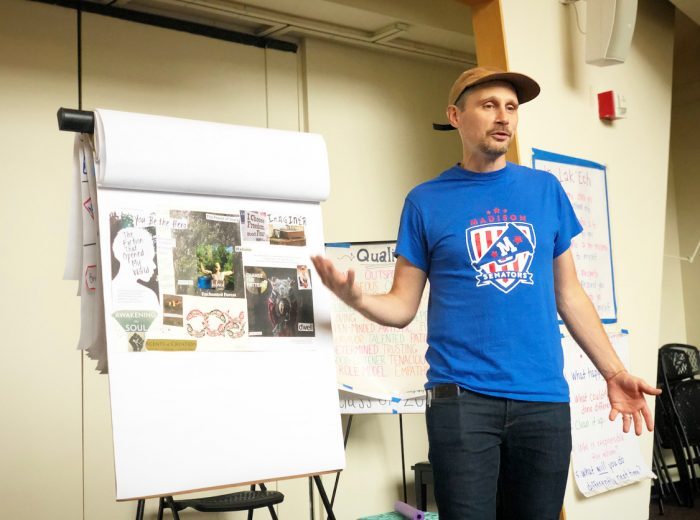When you look at the larger narrative around Portland Hip Hop, it usually boils down to an ongoing quest for respect. Who’s going to be the next to blow up? Who’s going to put the city on the map? Who’s dictating which artists get shine? Who got left off the latest top 10 list? Many of these conversations also feel like “inside baseball”–debates between artists, promoters, media personalities, and fans who mostly frequent shows where they serve alcohol.
If we’re forecasting the future of the scene, perhaps a better question is, how are the youth engaging with Portland hip-hop? Recently, I had the opportunity to get a glimpse of one example while working as a guest writer for McDaniel High School’s (formerly Madison) Hip Hop Lit class with Jesse Gardner aka Jesse the Imaginer. The collaboration was part of the Literary Arts’ Writers in the Schools (WITS) program. Gardner is in his second year of teaching Hip Hop Lit, which he credits Franklin High teacher and Speaker Minds member Desmond Spann with bringing to Portland Public Schools.
“There is so much potential with this class,” he says. “Shoutout to Desmond because he had the idea of teaching Hip Hop Lit in PPS over seven years ago and it’s just now seeing the light of day.”
The class itself approaches literature through the cultural lens of hip hop. According to Gardner, the grand vision is to “liberate the English language, build knowledge of self and community and express and write our stories through the elements of Hip Hop, which will play a part in obliterating white body supremacy.” Throughout the course, students learn about the history of Hip Hop and its connection to the economics of the late 60s and early 70s Bronx, engage with the different elements of the culture, and express and document Hip Hop through writing and reflection. For example, the final project of the WITS residency prompted students to profile figures from the local hip hop scene, which Gardner compiled into a magazine. Interviewees ranged from artists who frequent WOHM like Karma Rivera and Mic Crenshaw to brands like Produce Portland to up and coming artist classmates. Check out a few excerpts below:
“It was a pleasure talking to Mic, he is a really smart dude and when I talk to him I feel the OG vibes. He spoke to me on a lot of different things such as his life story, being an anti racist skinhead, and his thoughts on why rappers are targeted by the Police as well as his thoughts on the BLM movement. Mic taught me that you can go from doing something for fun to having that lead you towards what your life’s career will end up being. A question in my mind after the interview about society in America: Why is our Black culture so glorified by white people but they hate us as individuals?”
Crenshaw’s Wisdom by Ayden Brannon
“During my research about Jacque I found out that she is not only an artist but a Highschool teacher, an activist and a mother. A whole superwoman, it is beyond amazing to see women in our community accomplish so much. This inspires young females to follow their dreams. She wants to make differences in our community and she stands up against Police brutality.”
Jacque Dixon by ZamZam
“Hip-hop culture is everything to him. He talked about how through Hip Hop you make the impossible possible. Dance is one of the elements of Hip Hop and Malik expressed that the whole culture has a strong musical voice that is inspiring and special when you see and hear it.”
Malik — The Street Dancer by Zawadi
As an artist himself and one third of Soul Plug Anonymous, Gardner is very intentional about creating an environment that truly activates his students. With distance learning, this is particularly difficult, but he says the key is making lessons relevant.
“As an educator I look back at my journey and what would have been most beneficial for me to both grow in academic skills, and in my emotional intelligence while not just doing seemingly meaningless assignments,” he says. “This opportunity to interview a Hip Hop artist connected students with actual artists putting out impactful music in the community, so it gave relevance to school work. I witnessed students with a little help from us, step out and in an empowered way, set up interviews, write insightful profiles and tell stories.”
Going forward, Gardner hopes more schools invest in Hip Hop Lit. He credits hip hop with inspiring his interest in language and believes classes like this could do the same for countless students. However, he also notes that equity and authenticity are crucial.
“I didn’t have an affinity with language arts until I realized what these emcees were doing in their 16 bar verses that had me mesmerized,” says Gardner. “That’s how I got on this path of teaching–through Hip Hop. More classes like Hip Hop Lit can bring relevance and energy to English class to build that knowledge of self and community.
“There is a nuance to this question as well, because the teacher needs an authentic connection with the culture and to be practicing equity. For myself that means ownership that I’m a white male, who raps and loves Hip Hop, and is a guest in the artform. I don’t want to say that any English or social studies teacher should teach Hip Hop Lit, but every educator must find their way into centering equity practice in the classes they teach [in a way] that is authentic to them.”
With Gardner, that authenticity is evident in his love for spreading knowledge of the culture and empowering his students. One development from the first two years of his Hip Hop lit class that he’s particularly proud of is a group that formed during the first year called the Remarks. At the time, the class only consisted of several students, all of whom either rapped or produced. They decided to form a group and began recording at My Voice Music. Some even performed at Boise-Elliot/Humboldt School.
“Being an artist who teaches, my primary goal is to awaken genius and creativity; individually and collectively,” says Gardner. “I have much growing to do in this, but when those pockets of liberated expression happen in the classroom, it is gold.”
Amari aka Ace King, one member of the Remarks, brings things full circle with his profile of fellow McDaniels artist OneVoice. According to Amari, the two made a deal to record their interviews in these early years so they can look back, laugh and compare them with ones they plan to have with “big famous celebrities with talk shows.” In his profile, Interview with OneVoice, Amari writes:
“So my man Santiago (aka OneVoice) is a very bright, intelligent, extrovert type of person. Santiago was always into music from a very young age. At first it was just listening to music, until one day he thought of creating his own music and being better than the artists he listened to one day. When starting, his only problem he dealt with was his flow. He got that under control with the help of a couple of friends he ran into once he got into high school. He is currently a 17-year-old rapper who is mainly on the topic of depression and life problems. [He] Really gets in touch with that side of rap because that’s one of the topics he speaks strongly in. His main goal with rapping is just getting his message out to the people he believes could use a word or two about what he talks about in his music. That is one of the main reasons why he agreed to do music. If he got famous, he wouldn’t mind the attention and money that came along with it, but he mainly does this to support other people, which is a great reason if you ask me.”

